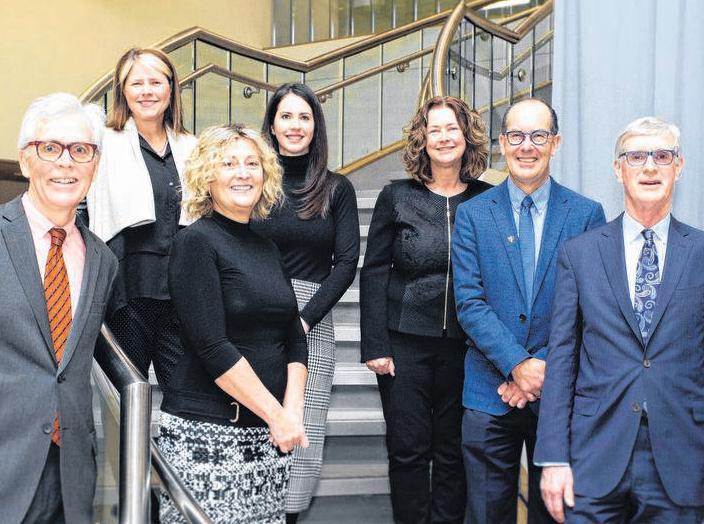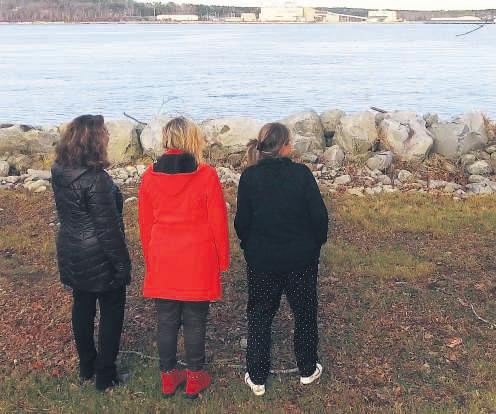
11 minute read
Transforming palliative care
Members of the Murphy family alongside palliative care champions at the QEII Foundation’s announcement event unveiling the family’s $4-million gift to transform palliative care. Pictured – back (left to right): Lisa Murphy (J & W Murphy Foundation), Julie MacKean (QEII Foundation), Karen Spaulding (J & W Murphy Foundation) and Dr. David Anderson. Front (left to right): Dr. Paul McIntyre, Holly Murphy (J & W Murphy Foundation) and Dr. Drew Bethune. QEII Foundation
The QEII Foundation celebrates a $4-million donation to transform palliative care
Advertisement
A family’s game-changing support of palliative care research and Hospice Halifax
By Jenna Conter
On February 26, the QEII Foundation announced that the Murphy family — on behalf of the J & W Murphy Foundation — made a $4-million donation to help transform palliative care in our region. $3 million will be the catalyst in creating an Endowed Chair in Palliative Care and $1 million will provide critical funding for Hospice Halifax. When people think of the terms ‘palliative’ care and ‘hospice’, it is common to associate them with end-of-life care. However, although they are inextricably linked, Dr. Rob Horton believes that this generous gift from the Murphy family will help shatter some of the misconceptions surrounding palliative care and raise awareness of its importance for patients facing a life-limiting illness and their families. Dr. Horton, a palliative care physician at the QEII Health Sciences Centre, knows too well the assumption that hospice and palliative care is nothing more than an individual’s choice between spending their last moments in the hospital or at home. “It’s a form of care that focuses on the patient, preparing them and their families for tasks associated with dying – ranging from complex decision-making to bringing resources in the community together to try to make the best of one of the most profound times of our lives,” says Dr. Horton. According to Dr. Horton, palliative care can include managing pain and symptoms, planning for the future, and addressing the physical, emotional, social, and spiritual needs of patients and their families. Dr. Horton is a longtime board member of Hospice Halifax, who got involved in the local non-profit after years of working in the system with a front row seat to where and how improvements can be made. “I think that’s where the Murphys are coming from,” he says. “They have experienced palliative care from a personal standpoint more than once and they’ve seen the good in the system — what can be done well — and they’ve also experienced some of the gaps.” The Murphys lost three family members in painfully quick succession a few years previous to their monumental gift — the largest one-time donation of its kind to the QEII Foundation to terraces and garden, overnight accommodation for families, and more. The new hospice will welcome about 150 patients a year, whose palliative care needs cannot be met at home and who do not require care in a hospital. In addition to their game-changing support of Hospice Halifax, the Murphys chose to invest in groundbreaking research by helping to establish an Endowed Chair in Palliative Care. Endowed research chairs at the QEII are world-renowned experts in their field who are cross-appointed at the QEII, Nova Scotia Health Authority (NSHA) and Dalhousie University. “When donors invest in the creation of an endowed chair position, they are doing so much more than supporting the role of an additional researcher in that field,” says Dr. David Anderson, Dean of the Faculty School of Medicine at Dalhousie University. “They are ensuring that from this point forward, long-term, stable research funding for palliative care is available indefinitely.” At its heart, the Endowed Chair in Palliative Care will be dedicated to leading palliative care research at the QEII and, ultimately, translating evidence-based findings into best practices, policies and training that will be adopted here at home — and both nationally and internationally. Research conducted around the globe has already demonstrated that quality palliative care improves patient and family quality of life and well-being, reduces healthcare costs and, in many instances, even prolongs life. “The Endowed Chair in Palliative Care will build upon these findings and help establish the QEII as a true centre of excellence in this area,” says Bill Bean, president and CEO of the QEII Foundation. “On behalf of all Nova Scotians, we’re incredibly thankful to the J & W Murphy Foundation and the entire Murphy family for their visionary commitment to transform palliative care in our region.” It’s a sentiment echoed by Dr. Anderson: “The importance of this cannot be overstated. It’s really a transformational gift that will allow us to practice the kind of informed care that is necessary to meet the needs of patients in this province,” says Dr. Anderson. To learn more about the Murphy family’s donation and the QEII Foundation’s vision for palliative care, visit QE2Foundation.ca/transform.
help ensure exceptional palliative care for all Nova Scotians. “To take that experience and step forward with a gift like this, is not only extremely generous, it carries with it a lot of foresight in terms of what can be done to make the system better. It’s very much a community-minded gift and I’m very excited to be part of the whole thing,” says Dr. Horton. With their transformational gift, the Murphy family funded the furniture, equipment, design and architecture needs within the new Hospice Halifax, which recently opened to its first patients. Hospice Halifax, like other hospices across the country, provides state-of-the-art palliative care and support services to individuals and their loved ones in a beautiful home-like setting. The 10-bed residence, located near the Northwest Arm in Halifax, features a family kitchen, outdoor


happens before more red blood cell units are ordered from Canadian Blood Services. “It is the first time we have used real-time patient data,” says Dr. Cheng. “It is a much closer daily look at what is going on in the health centre.” Now the QEII’s blood bank can keep a correctly-sized inventory of red blood cell products, wasting much less blood. Just over eight units of red blood cells are not used each month because they are too old. This compared to just over 19 units before the algorithm was implemented, according to a recent paper published in Transfusion, the most widely-read journal in its field in the world. By significantly reducing its own inventory, more blood products are freed up and available for other hospitals in the region. The blood used at the QEII is now also fresher. Blood has a shelf life of 42 days. “Blood is something we have to treat as a valuable asset,” says Dr. Quinn, the incoming medical director of the blood transfusion services. “It isn’t just a resource we make, like a drug. It is actually someone’s blood.” Dr. Cheng knew the blood bank had to become more efficient after he noticed too many red blood cell products were being thrown out because they were too old for use. Ordering red blood cells used to be done using a table that looked at average daily usage, explains Dr. Cheng. Technologists would be given a rough estimate of what was needed for a five-day inventory but often the inventory reached as high as a 10-day supply. Now with the algorithm, the estimating is gone and only
Doing better
Continued from Page 11
“The department of surgery is moving forward to start looking at the data we have already collected and see if we can make better use of it.” In order to do this, Dr. D’Avolio says it is imperative to ask the right people the right questions. He acknowledges researchers are working on some very interesting problems, but it’s in their nature to frame those problems in terms of what matters to them. In order to make meaningful change, researchers need to frame problems in terms of what matters to those who control access to the data needed. Dr. D’Avolio gives the example of accidental death due to medical error. “In the U.S. in 2015, researchers suggest on the lower end that number was 210,000 and on the higher end it was 400,000, but nowhere in the debate did anyone ask the question, ‘why don’t we know this number?’”
In the airline industry, every near-miss between airplanes is tracked. “We pay really close attention when 100 people die in an airplane, yet we don’t count whether it was 210,000 or 400,000 when they die in health S UMMER 2019 15
care,” he said. Part of the issue is we live in a culture where we are programmed to protect patient privacy, but the question then becomes, at what cost?
“Even if we go so far as to create registries, we go out of our way to de-identify them,” says Dr. D’Avolio. “So once we know something that can help you, we have no way to know if you are the person we can help.” The data is there and is readily available to start answering the three fundamental questions for improving anything: What are we doing? Is it working? What should we be doing? Dr. Dunbar adds that the QEII is ahead of other provinces in some ways because it is the leading hospital in Atlantic the correct amount of blood is ordered. “The algorithm looks forward and backward,” says Dr. Cheng. “This forward-looking part is the unique part.” Developed in 2015, Dr. Quinn has played a crucial role since then in sharing information about the algorithm and getting studies published. “We are trying to disseminate this algorithm so that other centres can better use this system,” says Dr. Quinn. “It is very novel. No one does anything like this.” In 2018, close to 13,800 blood transfusions took place at the QEII thanks in large part to the blood bank’s adequate blood supply. The QEII’s hematopathologists are confident the algorithm will allow doctors and nurses to continue performing their life-saving work and prevent unnecessary waste. “The bottom line is, it gives us a better ability to deliver blood to patients,” says Dr. Cheng.
Canada, and as such is a “living health lab.” “I think there are some good things that can be done with respect to understanding some of the outcomes that are already in front of us,” says Dr. Dunbar. He says the QEII also has an amazing opportunity to potentially design products, specifically in analytics. “That takes longer, but I think we can and should start. We have already tested the water and the pathway but what I am interested in, as part of the department of surgery, is making this happen for all of the divisions.” Dr. Dunbar says ultimately, this data can answer the burning question on the minds of all Nova Scotians — what can we do better?
as an outpatient. A point-of-care MRI would allow us to diagnose on the day of presentation rather than after a night spent at the hospital.” Having an MRI that can safely image patients closer to the emergency department holds considerable appeal for Dr. Schmidt. “For the first time it makes it practical for really sick people,” he says. Not content to observe the machine’s effectiveness from a purely clinical perspective, Dr. Beyea will study the patient experience as well. “A stroke survivor is going to work with our research team to develop feedback questionnaires. It is not only about superior technology, as it is equally as critical for us to understand how this might have changed the patient’s perspective and experience,” explains Dr. Beyea. “Did they see it as something that provided a value or not to their healthcare journey?” For Dr. Schmidt, this new version of MRI offers a chance to add a valuable new diagnostic resource to his repertoire. “It’s scary for patients who develop acute neurological symptoms when they are either admitted or sent home without all the answers,” says Dr. Schmidt. “As a diagnostician, I think it would be wonderful if I had a tool that would allow me to make a subtle diagnosis more confidently at the time of presentation. An exciting new tool today may become the standard of care tomorrow.” * Not yet approved for sale in Canada as a medical device.
Does your loved one need care?
We can help.

O!ering a full lifestyle continuum including Assisted Living and Memory Care.
Locations in Halifax, Dartmouth, Truro, Antigonish & Cape Breton
Call us today or visit our website for more information on availability and the lifestyle options in your area.
Live your best life.
Love Where You Live






Enjoying life is what it’s all about at The Berkeley.
Receive personalized aDenNon at The Berkeley and experience quality comfort and care in a safe, supporNve and social community.
We are pleased to offer several care opNons—independent and assisted living, memory care, short-term respite stays, and end of life care—to meet the various and changing needs of seniors. We support personal wellness, individual independence and privacy all while you age in place. When you’re at The Berkeley, you’re at home.





